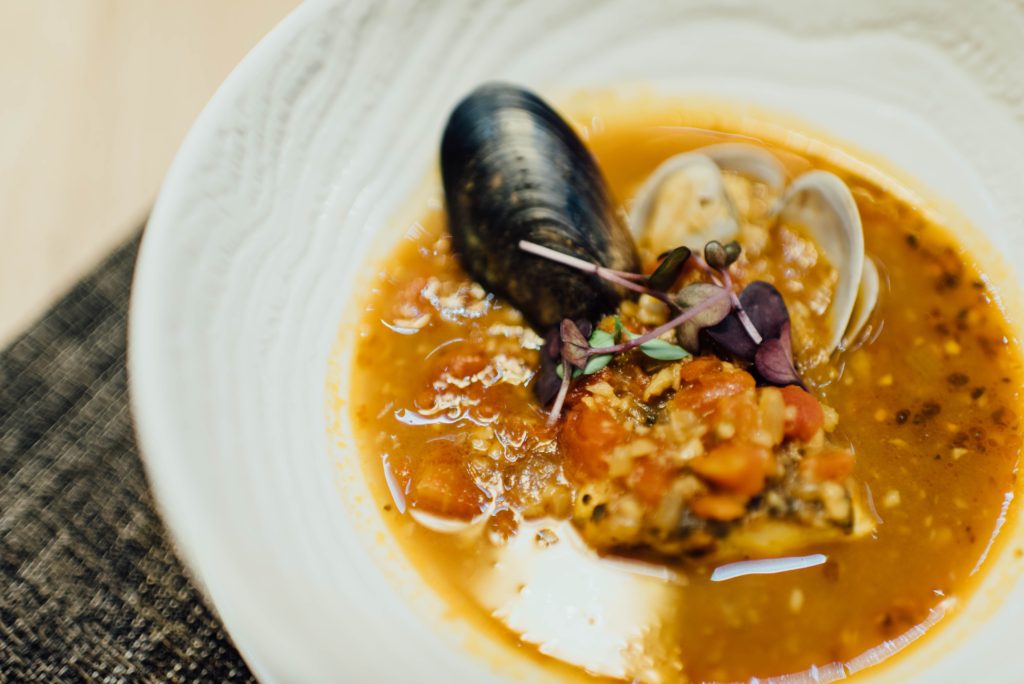
This is an actual conversation I had with a chef recently. He’s very nice and he’d gone out of his way to make a soup recipe that I’d written up for a magazine, but had never been able to try because it contained flour and butter. So he made a version with cornstarch and oil, just for me. Charming, until this happened:
Him: “It’s completely gluten free and dairy free, don’t worry.”
Me: “Thank you so much! What’s that spice you used in the fried polenta with it? I can’t quite figure it out.”
Him: “It’s just cornmeal, oil and salt. And a tiny bit of chicken base.”
Me: “Are you sure that’s gluten free?
Him: “It’s just a small amount like this [holds his fingers close together] in a giant pot.”
Me: “Hmm…”
The problem is, a lot of commercial chicken bases contain wheat. It’s right there on the ingredients list. This chef might have made his own, but from his answer that it was “just a small amount,” I’m pretty sure he didn’t. He wouldn’t want the liquid to make the fried polenta mushy, so it makes sense to use a powder, which no chef is going to dehydrate himself on an island as humid and hot as the one where he works.
The real problem is that a tiny bit of gluten is still too much gluten for a gluten free diner. I wasn’t kidding when I said I can’t have even a little gluten, which is more gluten than I was promised. I’m the one suffering today, not him. My stomach hurts, I slept horribly, didn’t digest anything well yesterday and was sick all morning. You, a very nice person, have unintentionally wrecked my stomach and my ability to function as a rational, healthy human being for one to two days. Some of my other gluten free friends have even worse reactions.
I’m pissed off, which is another of my usual reactions to gluten (good old gut-brain connection) and is enhanced by the lack of sleep and poor digestion. You’d be cranky too if you woke up at 2am and then at 4am and then lay in bed for three hours until you gave up on the hope of sleep. You’d also be cranky if your stomach was so inflamed that you looked pregnant and were expected to go to another dinner tonight where you don’t know if that chef will gluten you too.
I’m writing this because it’s turned into a trend on this island. Two nights in a row, in fact. The night before, a piece of pasta showed up in my seafood soup, which I’d been guaranteed was gluten free. I showed the server, who checked with the kitchen and it turned out to be a piece of crab (never mind the fact that a piece of crab looks like a piece of pasta). “Don’t worry! It’s just crab!” she said, and I breathed a sigh of relief until I realized I needed to ask a follow-up:
“Real crab or fake crab?”
“Fake crab.”
Me: “That contains gluten.”
Her: “It does?”
Me: “It does.”
I don’t care if it was a small amount in a giant pot. It’s still too much gluten.
And it happens in plenty of other places. It’s at the point where I expect to get sick at least once on a week-long trip, especially if it’s to a foreign country. “Gluten free” is a new shiny piece of marketing for their restaurants, but if you don’t know what you’re doing, you’re going to get yourself in trouble. Diners write negative reviews and you become blacklisted.
Better to not say you’re gluten free at all until you start taking gluten and contamination more seriously. Because many people will worry that if you don’t take gluten seriously, how seriously are you taking anaphylactic allergies like nuts? I get sick for a couple days, but at least I won’t die.
It’s one thing if you’re Celiac and you want to have the pizza that’s cooked in the same oven as the regular pizza, or the fries that are fried in the same fryer – you’re taking your digestive health into your own hands at that point – but if a menu says something is gluten free and the chef or owner signs off on it not containing any ingredients that contain gluten, then I’m trusting you to make it actually gluten free.
Because a tiny bit of gluten, for me and for most gluten intolerants, will always be too much gluten.
Leave a Reply